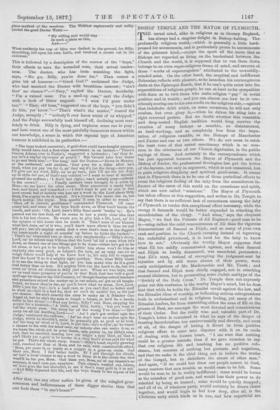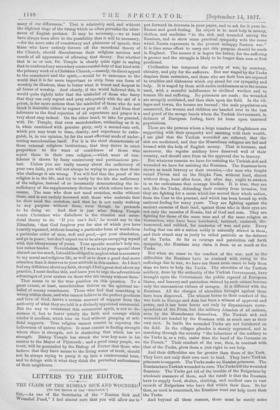BISHOP TEMPLE AND THE MAYOR OF PLYMOUTH,
THE carnal mind, alike in religious as in literary England, has always had a singular delight in Bishop-baiting. The professedly religious world,—which is generally a little hard- pressed for amusements, and is particularly prone to amusements of the grimmer kind,—enjoys the sport all the more that as Bishops are regarded as living on the borderland between the Church and the world, it is supposed that to run them down belongs to an even super-religious frame of mind, and savours of those "works of supererogation" attributed to the unworldly- minded saint. On the other hand, the sceptical and indifferent Bohemian reflects with pleasure, as he launches his contemptuous darts at the Episcopal Bench, that if he can't quite enter into the superstitions of religious people, he can at least so far sympathise with them as to twit those who make religion " pay " in social position and in wealth ; and you can almost see how he is con- sciously scoring one to his own credit on the religious side,—against that indefinite debit which, on some occasions, he will not only confess, but even glory in,—when he drives his sting into a right reverend prelate. But we doubt whether this venerable and deep-seated English tradition would long survive the creation of ninny bishops as sensible, as disinterested, as hard-working, and as completely free from the impu- tation of religious twaddle, as the Bishops of Manchester and Exeter and one or two others. We do not seem to catch the least tone of that unreal sanctimony which is so com- mon in the utterances of our Church dignitaries, in the public sayings of these. And certainly in the correspondence which has just appeared between the Mayor of Plymouth and the Bishop of Exeter, the professional theologian has got the better of the layman, not only in argument, which is not unnatural, but in plain religious simplicity and spiritual good-sense. It seems that in Plymouth there is to be one of those periodical efforts to rouse the religious feeling of the laity from the somniferous in- fluence of the cares of this world on the conscience and spirit, which are now called "missions." The Mayor of Plymouth has taken offence at this suggestion, and writes to Dr. Temple to say that there is no sufficient lack of earnestness among the laity of Plymouth to render this exceptional effort necessary, while the energy it demands would be better expended in attacking the saeerdotalism of the clergy. "And when," says the eloquent Mayor, "we find the Primate of All England—good man as he is—using rather the mild remonstrances of Eli than the vigorous denunciations of Samuel or Elijah, and so many of your own rank and position in the Church excusing instead of reproving the unfaithful priesthood, it is hard for the laity to know how to act." Obviously the worthy Mayor supposes that what Eli too mildly remonstrated against, and what Samuel and Elijah so loudly denounced, was sacerdotal pretension ; that Eli's sons, instead of corrupting the judgment-seat by injustice and by still worse abuses of their power, were early anticipations of Mr. Mackonochie and Mr. Tooth ; and that Samuel and Elijah were chiefly engaged, not in attacking sensual idolaters, but in prosecuting some Judaic antitype of the "Society of the Holy Cross." Dr. Temple does not expressly point out this confusion in the worthy Mayor's mind, but he does hint that while he holds the Ritualist revolt against the law, and the Ritualist ideas of worship, as indicating serious retrogressions both in ecclesiastical and in religious feeling, yet many of the Ritualist leaders, far from resembling either the sons of Eli or the priests of Baal, are amongst the most devoted and conscientious of their Order. But the really wise and valuable part of Dr. Temple's letter is contained in what he says of the danger of treating Sacerdotaliten too controversially and directly, and most of all, of the danger of letting it divert us from positive religious effort to enter into disputes with it on its mode of dealing with the human heart. "I am sure that nothing could be a greater mistake than if we gave occasion to say that our religious life and teaching has no positive sub- stance, but consists of nothing but protests and negations, and that we make it the chief thing not to believe the truths of the Gospel, but to disbelieve the errors of other men," And again, "If we could but draw our people nearer to God, many matters that now trouble us would cease to be felt. Some would be seen to be in reality indifferent ; some would be borne as the mistakes of good men, and would lose their power to do mischief by being so treated ; some would be quietly dropped ; and all of us, of whatever party, would certainly be drawn closer together, and would begin to feel how deep, after all, is the Christian unity which binds us in one, and how superficial are many of our differences." That is admirably said, and without the slightest tinge of the twang which so often pervades the utter- ances of English prelates, It may be necessary,—we at least have always been alive to the possibility that it will be necessary, —for the mere sake of consistency and plainness of speech, that those who have entirely thrown off the sacerdotal theory of the Church, should disembarrass their religious services and creeds of all appearance of affirming that theory. But whether that is so or not, Dr. Temple is clearly quite right in saying that to confound any secondary controversial duty of that kind with the primary work of a Christian Church,—namely, its direct appeal to the conscience and the spirit,—would be to announce to the world that it is far more important to strip from one form of worship its illusions, than to foster what is truest and deepest in all forms of worship. And clearly, if the world believed this, it would quite rightly infer that the misbelief of those who fancy that they can only repent and pray adequately with the aid of a priest, is far more serious than the misbelief of those who do not think it desirable either to repent or pray at all. And from that inference to the final rejection of all repentance and prayer is a very short step indeed. On the other hand, to take for granted, with Dr. Temple, that even sacerdotalism, misleading as it is, is, when combined with genuine piety, only a second-rate evil, which you may trust to time, charity, and experience to extin- guish, is, in our opinion, by far the most effectual mode of under- mining sacerdotalism itself. For it is the chief characteristic of these external religious institutions, that they thrive in exact proportion to the want of confidence of those who reject them in their own religion,—which want of con- fidence is shown by fussy controversy and pertinacious pro- test. Unless you are really uneasy about the sufficiency of your own faith, you will not always be trying to prove that those who challenge it are wrong. You will feel that the proof of the religion is in the life, and try to verify by the life the sufficiency of the religion, instead of so incessantly demonstrating the in- sufficiency of the supplementary devices to which others have re- course. The man who does not need crutches, walks without them, and is not unduly incensed with those who maintain that he does need the crutches, and that he is not really walking to any purpose without them, even though he pretends to be doing so. And that is just what Bishop Temple wants Christians who disbelieve in the ritualist and sacer- dotal theory to do. 'If you can't feel,' he would say to the Ritualists, 'that God forgives you for sins of which you have heartily repented, without hearing a particular form of words from a particular order of men, well and good,—get your absolution, and go in peace; but don't expect me to be always occupying myself with this idiosyncrasy of yours. Your specific wouldn't help me, but rather hinder. Nevertheless, if I were to let your special ideas disturb me too much, I should be obliged to neglect what is necessary to my moral and religious life, as well as to draw a good deal more attention than it deserves to your attitude in this matter. As I don't feel any diffidence about my faith, though I feel agreat deal about my practice, I must decline this, and leave you to urge the adventitious advantages of your system on those who are uneasy without them.'
That seems to us the true position on this question. To a great extent, at least, sacerdotalism thrives on the spiritual un- belief of uneasy consciences. Those who feel that something is wrong within them, and who cannot believe in the perfect goodness and love of God, derive a certain amount of support from the authority of what they are told is a divinely appointed ceremonial. But the way to counteract this ceremonial spirit, is not to de- nounce it, but to foster quietly the faith and courage which render it needless, which lean on God without grasping at arti- ficial supports. True religion cannot consist in exposing the hollowness of untrue religion. It must consist in finding strength where there is strength, not in shattering that which has no strength. Bishop Temple has struck the true key-note in his answer to the Mayor of Plymouth ; and a good many people, we trust, will be persuaded by the Bishop of Exeter that those who believe that they have access to the living water of truth, should
not be always trying to pump it up into a controversial hose, and to deluge with it what they think the perverted enthusiasms of their neighbours.































 Previous page
Previous page